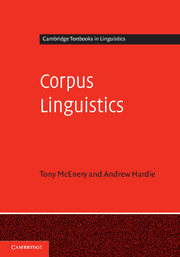Book contents
- Frontmatter
- Contents
- List of figures
- List of tables
- Acknowledgements
- Preface
- 1 What is corpus linguistics?
- 2 Accessing and analysing corpus data
- 3 The web, laws and ethics
- 4 English Corpus Linguistics
- 5 Corpus-based studies of synchronic and diachronic variation
- 6 Neo-Firthian corpus linguistics
- 7 Corpus methods and functionalist linguistics
- 8 The convergence of corpus linguistics, psycholinguistics and functionalist linguistics
- 9 Conclusion
- Glossary
- Notes
- References
- Index
2 - Accessing and analysing corpus data
Published online by Cambridge University Press: 05 June 2012
- Frontmatter
- Contents
- List of figures
- List of tables
- Acknowledgements
- Preface
- 1 What is corpus linguistics?
- 2 Accessing and analysing corpus data
- 3 The web, laws and ethics
- 4 English Corpus Linguistics
- 5 Corpus-based studies of synchronic and diachronic variation
- 6 Neo-Firthian corpus linguistics
- 7 Corpus methods and functionalist linguistics
- 8 The convergence of corpus linguistics, psycholinguistics and functionalist linguistics
- 9 Conclusion
- Glossary
- Notes
- References
- Index
Summary
Introduction
The role of corpus data in linguistics has waxed and waned over time. Prior to the mid-twentieth century, data in linguistics was a mix of observed data and invented examples. There are some examples of linguists relying almost exclusively on observed language data in this period. Studies in field linguistics in the North American tradition (e.g. Boas ) often proceeded on the basis of analysing bodies of observed and duly recorded language data. Similarly, studies of child language acquisition often proceeded on the basis of the detailed observation and analysis of the utterances of individual children (e.g. Stern and Stern ) or else were based on large-scale studies of the observed utterances of many children (Templin ). From the mid-twentieth century, the impact of Chomsky's views on data in linguistics promoted introspection as the main source of data in linguistics at the expense of observed data. Chomsky (interviewed by Andor : 97) clearly disfavours the type of observed evidence that corpora consist of:
Corpus linguistics doesn't mean anything. It's like saying suppose a physicist decides, suppose physics and chemistry decide that instead of relying on experiments, what they're going to do is take videotapes of things happening in the world and they'll collect huge videotapes of everything that's happening and from that maybe they'll come up with some generalizations or insights. Well, you know, sciences don't do this. But maybe they're wrong. Maybe the sciences should just collect lots and lots of data and try to develop the results from them. Well if someone wants to try that, fine. They're not going to get much support in the chemistry or physics or biology department. But if they feel like trying it, well, it's a free country, try that. We'll judge it by the results that come out.
The impact of Chomsky's ideas was a matter of degree rather than absolute. Linguists did not abandon observed data entirely – indeed, even linguists working broadly in a Chomskyan tradition would at times use what might reasonably be described as small corpora to support their claims. For example, in the period from 1980 to 1999, most of the major linguistics journals carried articles which were to all intents and purposes corpus-based, though often not self-consciously so. Language carried nineteen such articles, The Journal of Linguistics seven, and Linguistic Inquiry four. But even so there is little doubt that introspection became the dominant, indeed for some the only permissible, source of data in linguistics in the latter half of the twentieth century. However, after 1980, the use of corpus data in linguistics was substantially rehabilitated, to the degree that in the twenty-first century, using corpus data is no longer viewed as unorthodox and inadmissible. For an increasing number of linguists, corpus data plays a central role in their research. This is precisely because they have done what Chomsky suggested – they have not judged corpus linguistics on the basis of an abstract philosophical argument but rather have relied on the results the corpus has produced. Corpora have been shown to be highly useful in a range of areas of linguistics, providing insights in areas as diverse as contrastive linguistics (Johansson ), discourse analysis (Aijmer and Stenström ; Baker ), language learning (Chuang and Nesi ; Aijmer ), semantics (Ensslin and Johnson ), sociolinguistics (Gabrielatos et al. ) and theoretical linguistics (Wong ; Xiao and McEnery ). As a source of data for language description, they have been of significant help to lexicographers (Hanks ) and grammarians (see sections 4.2, 4.3, 4.6, 4.7). This list is, of course, illustrative – it is now, in fact, difficult to find an area of linguistics where a corpus approach has not been taken fruitfully.
- Type
- Chapter
- Information
- Corpus LinguisticsMethod, Theory and Practice, pp. 25 - 56Publisher: Cambridge University PressPrint publication year: 2011



